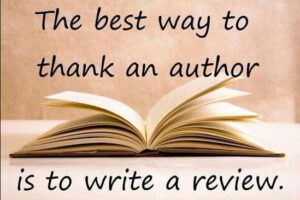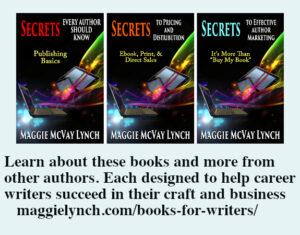By Debbie Burke
“Fly-by-Night Book Reviews says, for $100, they’ll give me twenty guaranteed reviews. Should I try that?”
“I paid $500 to Pie-in-the-Sky Reviews. My book didn’t receive a single review.”
“You don’t dare pay for reviews—that violates Amazon’s terms and conditions. You’ll be banished.”
“Kirkus Reviews are the gold standard.”
“Ever since Kirkus started selling reviews, they lost all credibility.”
~~~
That’s a sample of the spirited responses and contradictory opinions on a recent Authors Guild discussion thread about whether or not to pay for book reviews.
I wound up thoroughly confused, pondering the following questions:
How much do reviews really matter?
Are there still “legitimate” book reviews? What defines “legitimate”?
Have reviews merely become another profit opportunity for vendors peddling them?
Do customers really believe Amazon reviews?
Do reviews increase sales?

Author Maggie Lynch
Multi-genre author Maggie Lynch participates frequently in AG discussions. Over years of reading her contributions, I’ve come to trust her knowledge, judgment, and analysis. Her data is carefully researched. She looks at publishing history from the long view and puts so-called new trends in perspective.
During this ongoing, weeks-long debate about book reviews, one day Maggie wrote: “Warning, I’m going on a bit of a rant.”
What followed was her essay that offered a fresh perspective and updated information about reviews that all authors can benefit from.
I asked if I could share her “rant” at TKZ and she kindly agreed.
Here’s what Maggie has to say:
Paid reviews have always been around, long before the advent of the Internet. Who do you think paid for placement in magazines, journals, and newspapers?
When a publisher buys an end cap display in a bookstore and provides potential review quotes for the store to post, isn’t that paid? If your book is featured on the front page of a major genre magazine, it gets attention. The magazine is going to do a review because you paid $2-$5K to be there.
All advertising is, in effect, paid reviews.
The only difference now is that there are more books, more online venues, and more authors willing to pay for ads, reviews, and all kinds of placement.
Once Amazon entered the online market, it became the focus of most authors. Not because it is the only distributor, but because it is the only distributor using sophisticated algorithms that are somewhat transparent. A number of analysts and programmers focus on Amazon algorithms and then share that information via their own book publications.
Whether you love or hate Amazon, it’s a great search engine. They understand data. They understand how to present the most likely options for getting a sale from a customer. IMO there is no other bookseller with programming that sophisticated.
If other major booksellers–Apple, Kobo, Google, the Big 5—had that same search and analysis capability, they would get more customers as well.
For myself, I have many reasons not to like Amazon. Yet, I give them props when they do well. If I want to find a book or learn more about an author, I’ll look it up on Amazon first because I know it will be quick with lots of information–including other books in the same genre, series, similar authors, etc.
I will likely end up buying the book somewhere else to support a local bookstore or another vendor, but I go to Amazon first.
Many people stay on Amazon because of that ease of use. Authors often believe (mistakenly in my opinion) that they only need to be on Amazon.
But…book sales are NOT Amazon’s primary business.
Only 10% of Amazon’s overall revenue is book sales.
Unfortunately, far too many people think they can game the system. I know hundreds of authors who spend more time trying to figure out how to get higher ranking on Amazon than they do writing books. It’s crazy.
Review factories have always been a part of the online book environment. When I first entered indie publishing in 2011, there were entire “review factories” in Asia where one could buy 100 reviews from “sock puppet” accounts. They were pretty obvious back then, poorly written, using similar phrases.
A couple of times, Amazon has cracked down on these practices–usually when it becomes obvious and egregious. But they usually do it through programming changes.
In the process, some books with legitimate reviews get caught in the net. When crackdowns happened in 2014 and 2018, many authors lost hundreds of reviews and waited months to have them reinstated.
[Note from Debbie: I know authors who simply gave up fighting and started from scratch all over again. Sad.]
Whenever Amazon makes a programming change to search out and punish fake reviews, those who make money on reviewing simply find a more sophisticated way not to get caught.
Algorithm watchers believe that instead of looking for and stopping these reviewers, Amazon is proactively changing the algorithm to counteract the sway of review farms.
Now reviews are weighted significantly less in the algorithm than they have been in the past.
Of course, no one knows how much less or what the criteria are, but it is something to consider. Because of that, authors who are focused on reviews simply pay more.
Authors consistently worry/believe that a high number of reviews (particularly on Amazon) means a high number of sales. That is not necessarily the case.
It is more likely that a high number of sales means a high number of reviews, UNLESS reviews have been supplied primarily by non-purchasers.
To evaluate this, look at the Top 100 bestsellers in Amazon. Many have ZERO reviews. Why? Because the book hasn’t been released and is selling on pre-order. What is creating those sales? Many factors that have nothing to do with reviews such as:
- Advanced audience definition;
- Pre-press ads, word of mouth, news, reaching out to fans;
- Building anticipation for the book followed by a launch blitz that delivers on the promise;
- ARCs to media and other reviewers (NetGalley, Edelweiss).
It may also be that Amazon never shows a lot of reviews for a particular book because the primary sales are on other sites, NOT Amazon. Many print books sell in bookstores, libraries, or direct from the publisher.
Reviews are not the answer to low sales. Do they help? Good ones do, those that provide information and key ideas to appeal to the audience you want. But the number of reviews does not necessarily correlate to sales.
The last good analysis I read about Amazon indicated there were more than 300 data points that are weighted in the sales and ranking algorithms.
THREE HUNDRED!
Where do reviews stand in that weighting? Not at the top. Probably not even the top 10.
The reality is the #1 weight is actual sales.
You have direct control of many other factors that guarantee more sales such as:
- Create a fan base;
- Write more books;
- Identify your audience;
- Deliver to their expectations with a consistent brand.
Of course, these take work and time. They can’t happen overnight.
But many authors want a fix right now, an easy button to push.
People always want an easy answer as to why their book isn’t selling better. They don’t want to accept the more likely reasons it’s not selling better.
The reality is the majority of the book reading public has fairly narrow interests.
My fantasy fans rarely cross into SF. My SF fans almost never cross into romance. My Women’s Fiction fans don’t like anything else in fiction. My nonfiction readers rarely read fiction.
That’s just from my list of fans–a small number of 12K people. But the sample size is enough to extrapolate statistically.
Identifying the audience and creating a package that appeals to them on many levels is key. That package includes:
- Excellent blurb that makes the reader want to learn more;
- Great cover;
- Appropriate pricing for the genre;
- Look Inside/Preview pages that draw the reader in;
- Advance praise from ARC readers that tells the reader what to expect and why they loved it.
Indie authors particularly get uptight about reviews—they can see the numbers go up and believe they can control that. Then they start paying for reviews because they believe more reviews equals more sales. But that is a false sense of control.
Where do you stop paying? Is 50 enough? How about 100?
I now see books with over 100K ratings. Are you kidding me?
The get-more-reviews game is one you can’t win because:
- You likely don’t have the budget for big PR or marketing campaigns;
- You can’t compete against contacts that big publishing houses have.
Amazon’s own imprints publish roughly 1,000 books a year, making it as large as the Big 5 publishers.
Amazon controls all the data and knows the sales information. They can certainly tweak the metadata as needed to drive sales within their algorithm. Other publishers can do this too, if they know how and employ people to do it. Most don’t, not even the Big 5.
What can the average author do to compete?
First, do not accept Amazon as the arbiter of books or literature.
They are not. Don’t become one of those authors–and some small publishers– who have bought into the Amazon way of book sales–low pricing, multiple promotions, exclusivity.
Small publishers and indie authors have given Amazon all this power yet selling books is less than 10% of Amazon’s revenue.
Second, you can shout and bring bad practices to the fore.
Point it out and most of all DO NOT PARTICIPATE in the bad practices yourself.
We can’t let our avarice, our immediate desire for an easy-button solution, give us permission to game the system, pay for reviews, tell lies, or buy hundreds of print books to try to make the bestseller list.
If few authors engage then it will become evident that no one can make good money off of these deals.
Third, expend your energy in engaging with actual readers.
Build your mailing list, blog or use some other social media that you like to keep your readers informed.
Outside of your next book, the biggest asset is YOUR readers—people who have already voted with their dollars and their time to buy and read your book. Once they already read and like your book, they want more—more about you, more about upcoming books.
- They will tell their friends
- They will write reviews;
- They will volunteer to read ARCs in the future;
- They will post to social media;
- They will talk to libraries about carrying your book.
Your readers are your biggest asset.
~~~
Thank you, Maggie, for sharing your perspective and wisdom with TKZ!
Maggie reaffirmed my belief that time is best spent writing more books.
However, that doesn’t lessen my gratitude to readers who make the extra effort to write reviews!

~~~
 Learn more about Maggie Lynch and her 26 books at her author website.
Learn more about Maggie Lynch and her 26 books at her author website.
Check out her free video course about Why Books Don’t Sell. It covers the basics of putting together a good package for your book and buy pages with vendors.
On that same POV Author Services site she has many blogs just for writers about both business and technology, as well as mental health and philosophical writing concerns.
~~~
TKZers: What is your experience with reviews? Have you ever paid for reviews? Do you think they helped your sales?


